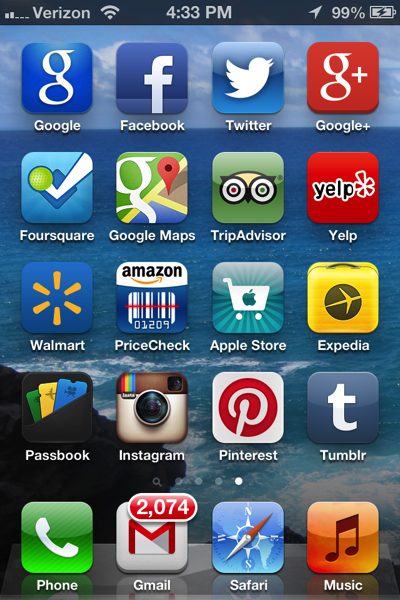What Google Won’t Tell You About Search Engine Marketing
Do you know what a search engine really is? Do you know how search engine marketing is continuing to evolve? No? Well, eMarketer has some crazy research out this week that talks about how companies are shifting US mobile ad dollars to search apps and how that will affect your business:
“As smartphone and tablet usage continue to increase, users are becoming more sophisticated, blurring their mental division between browsers and apps. Mobile marketers are responding to the fact that mobile search behavior is becoming less comparable with its desktop/laptop counterpart, and as a result, the market for mobile search advertising continues to fragment.”
Once upon a time, I posed a trick question, asking you all to consider the following image and answer which of the apps shown were search engines:

The reason it’s a trick question is because all these apps are search engines, with many vertical apps today taking the place of “traditional” search. As eMarketer notes:
“Google owned 82.8% of the $2.24 billion mobile search market in 2012… Google still dominates browser-based searches on mobile devices, but niche search apps are also becoming much more prevalent. This caused Google’s share to drop to 68.5% in 2013, according to eMarketer estimates, while the long tail of “other” companies increased share from 5.4% to 22.9%. This year, we expect Google’s share to fall again, to 65.7%, while the “other” category reaches 27.3%.”
Now, this doesn’t mean that Google’s shrinking, only that the use of mobile apps is growing faster than search overall as a means for customs to get answers to their questions.
So, who’s winning? It’s not just “search engines.” While “…search stalwarts like Yahoo and Bing” do well, a whole category known as “Other” has gained significant share. Who are they?
““Other” also includes niche service providers such as travel metasearch apps like KAYAK, job search apps like Indeed, e-commerce sales apps like Amazon and contextual search apps like Shazam… and Yelp is one of the companies beginning to emerge from the pack”
So, Google’s fallen from roughly 83% of all “searches” to only about 2/3rds in less than two years, with Yelp, Amazon, Kayak, and others gaining huge volumes. This demonstrates why I’ve suggested that local search increasingly is all about apps and that search engines will look very different in the coming months and years.
That’s also why I continue to recommend you improve your marketing through a variety of tactics:
- Build your email list and social connections. Bypass any intermediary — search engine or otherwise — and talk directly with your customers.
- Explore alternative marketing channels. Evaluate channels in use by your customers and seek ways to help them accomplish their goals in those channels.
- Learn from market leaders. A number of outstanding companies are using mobile to deepen their relationship with customers. Watch for best practices and look for opportunities to apply them to your business.
I can’t tell you for sure what search engines will look like in a year’s time — or whether your customers will use “search engines” at all. However, I can tell you how to prepare so that no matter how your customers search, you want to be sure they can find you.
Interested in learning even more about the future of e-commerce and marketing via the social, local, mobile web? Register to receive a special report I’ve produced in conjunction with hotel marketing firm Vizergy, “Digital Hotel Marketing in a Multiscreen World.” While it’s targeted specifically at hotel and resort marketers, the lessons apply to just about any business. You can get your free copy of the report here.
You may also want to review the tips in my recent presentation Digital Marketing Directions: Three Trends Shaping 2014 Hospitality Internet Marketing:
(And, yes… you can hire me to keynote your next event, too).
Finally, if you’re interested in learning even more about the future of e-commerce and marketing via the social, local, mobile web, register to receive a special report I’ve produced in conjunction with hotel marketing firm Vizergy, “Digital Hotel Marketing in a Multiscreen World.” While it’s targeted specifically at hotel and resort marketers, the lessons apply to just about any business. You can get your free copy of the report here.
You might also enjoy some of our past coverage of the social, local, mobile web and what it means for your business, including:
- What Your Customers Expect from Mobile and E-commerce in 2014.
- The Secrets Behind “It’s All E-commerce” for 2014
- Should Marketers Really Trust Google in 2014?
- The Zen of Digital Marketing Strategy
- 7 Steps to E-Commerce Heaven
- Today and Tomorrow: Mobile and The Changing Customer Journey
- Mobile Makes E-commerce Even More “Frictionless”
- Your 2014 Internet Marketing New Year’s Resolutions – Thinks Out Loud Episode 56

This Post Has 0 Comments